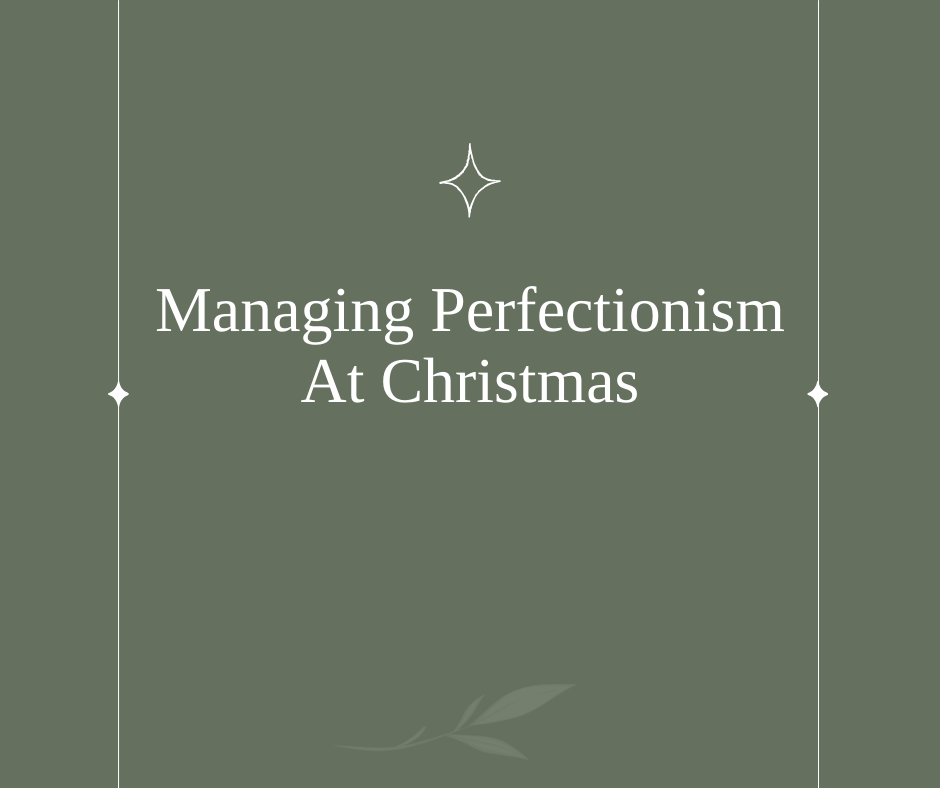At this time of year, there is a lot of pressure, particularly on mums, to create the perfect Christmas. Where does this pressure come from? I think social media is a big factor. Mums tend to spend quite a bit of time on online where it’s easy to be influenced by the things we see. Have you ever noticed yourself falling into a comparison trap in the run-up to Christmas? I know I have!
Instagram would have us believe we need to buy the perfect presents for our children, book lots of magical Christmas adventures and decorate every corner of our homes. The ornaments must be perfectly placed on the tree, and we need huge piles of gifts underneath. We’ve got to find the perfect Christmas jumper, matching Christmas PJs for the family and a glamourous outfit for Christmas Day. Don’t forget the advent calendars, the Christmas Eve boxes and the stockings. Most importantly, we need to snap the perfect photo for Instagram so everyone else can see how perfect and happy Christmas has been.
I imagine most people feel this pressure to a certain degree, but for perfectionists, it can be a really difficult season to navigate. Here’s why…
What is Perfectionism?
Perfectionism is a personality trait characterised by unrelentingly high standards in different areas of your life, such as school, work, relationships, health, well-being, and exercise.
You may be a perfectionist in all these areas, in some areas, or even just one. For example, you may not have a problem with your home being messy, but at work you are constantly striving to perform to exceptionally high standards and meet your goals at all costs.
Hang On, Isn’t Perfectionism a Good Thing?
A degree of perfectionism can be useful. Healthy striving helps you stay motivated and achieve success. But extreme perfectionism has the opposite effect. Instead of working hard to achieve your goals, you demand flawlessness. You fixate on imperfections, try to control situations, and tend to be very critical of yourself. This kind of perfectionism can prevent you from achieving your goals and almost always leads to more stress.
Perfectionists also tend to experience anxiety and depression. The anxiety is around meeting the standards they place on themselves while constant striving can lead to burnout and depression. Remember, most of the standards a perfectionist sets are unachievable in the first place.
When perfectionists don’t achieve their exceptionally high standards, it triggers negative core beliefs such as ‘I’m not good enough’, ‘I failed’, ‘I’m pathetic’ and ‘I’m unworthy’. This may lead them to implement even higher standards because of their desire to feel worthy and good enough when the goal is achieved. It’s a vicious cycle.
Managing Perfectionism at Christmas
Christmas can be challenging even if you’re not a perfectionist. If you are, it’s an obvious time for perfectionism to rear its ugly head. So, what can you do?
- Lower Your Expectations
The best way to manage perfectionism is to reduce your expectations on yourself. I’m not asking you to go from 100% effort to 0%. That’s not achievable. But what would life look like if you gave 90% or 80% effort? How would that feel? What would life look like if you weren’t trying to be perfect in the run-up to Christmas? Reduce the standards you normally place on yourself by a small amount and see how you feel.
- Embrace Imperfection
This is a hard one. Embracing imperfection probably feels really alien, but one of the best ways to become comfortable with something is to expose ourselves to it. This might look like taking a picture for Instagram and leaving your messy living room in the background. Or you could let the children decorate the Christmas tree without making any changes. Even though this might feel awkward or uncomfortable, it’s an opportunity for you to embrace imperfection and be curious about what happens.
- Practice Self-Compassion
I believe self-compassion is the best solution to many problems in life and tackling perfectionism is no different. Perfectionism tends to be driven by low self-esteem and low self-worth. Practising self-compassion can help us improve these things. Try reminding yourself that you’re a good mum regardless of how many presents are under the tree. You’re a good mum regardless of what dinner you cook on Christmas Day, or whether you even cook a Christmas dinner at all. You’re a good mum if your children haven’t got matching Christmas pyjamas and you’re a good mum if the lights don’t work on the tree. You don’t need to keep striving to feel like you’re enough because you are always enough. Discover more about treating yourself compassionately in my free Learning to Love Yourself Guide.
Find Out More
If you need more support to manage your mental health and you’re interested in working with me, you can book a free consultation here. I also share lots of tips and advice via Instagram.
